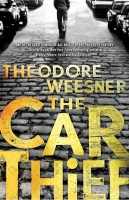The Car Thief
Theodore Weesner
Description:
It’s 1959. Sixteen year-old Alex Housman has just stolen his fourteenth car and frankly doesn’t know why. His divorced, working class, father grinds out the night shift at the local Chevy Plant in Detroit, looking forward to the flask in his glove compartment, and the open bottles of booze in his Flint, Michigan home. Abandoned and alone, father and son struggle to express a deep love for each other, even as Alex fills his day juggling cheap thrills and a crushing depression. He cruises and steals, running from—and then forcing run-ins with—the police, compelled by reasons he frustratingly can’t put into words. And then there’s Irene Shaeffer, the pretty girl in school whose admiration Alex needs like a drug in order to get by. Broke and fighting to survive, Alex and his father face the realities of estrangement, incarceration, and even violence as their lives unfold toward the climactic episode that a ‘New York Times’ reviewer called “one of the most profoundly powerful in American fiction.”
Reviews:
A remarkable, gripping first novel.
...a poignant and beautifully written novel, so true and so excruciatingly painful that one can't read it without feeling the knife's cruel blade in the heart.
A simply marvelous novel. Alex emerges from it as a kind of blue-collar Holden Caufield.
Author biography:
Theodore Weesner The late, great, Theodore (Ted) Weesner died in 2015. Known as the ‘Writer’s writer’ by the larger literary community, his novels and short works were published to great critical acclaim.Born in Flint, Michigan, to an alcoholic father and teenage mother who abandoned him aged one, he spent a large part of his childhood in an unofficial foster home of an immobile woman of over five hundred pounds. This, however, gave him and his elder brother, Jack, a degree of freedom to explore and have a wide variety of childhood adventures. He nevertheless became introspective as a teenager, with a rebellious streak, which led to him not graduating from high school and also becoming involved in petty crime. Eventually returning to the care of his father, he finally took off on his own when he lied about his age and joined the Army aged seventeen.
It was the Army that finally had the influence previously lacking in Weesner’s life, and whist serving he earned a high school equivalency diploma, which on leaving allowed him to gain a place at Michigan State University and then an M.F.A. degree from the University of Iowa Writers’ Workshop.
His experiences in the Army also provided material for two of his later books, and others gained from his many years of teaching at the University of New Hampshire, and later Emerson College. Put together with his earlier life experiences, ample material was available to provide a background for his plots, once he had honed his writing skills, and his works never lost their air of reality and his inherent understanding of human behaviour.
His first novel, ‘The Car Thief’ was published in 1972 after excerpts had appeared in ‘The New Yorker’, ‘Esquire’ and ‘The Atlantic Monthly’. It was a coming-of-age tale that critics found ‘original, perspicacious and tender’. Joseph McElroy, in ‘The New York Times Book Review’, referred to it as ‘a story so modestly precise and so movingly inevitable that before I knew what was happening to me I felt in the grip of some kind of thriller’. In his obituary of Weesner, published in the ‘New York Times’ in June 2015, Bruce Weber stated that ‘like many a critically appreciated book …. it faded rather quickly from view. But it became famous in literary circles as a forgotten gem’. It has since had a second life, being re-published twice more and continues to grip readers of a new generation as well as remaining popular with those who were its contemporaries.
Again, Weesner’s later work did not always enjoy the immediate commercial success that might be expected of critically acclaimed work – to the sorrow of his fellow writers, and recognised by Weesner himself, who was acutely aware of the ‘neglected writer’ label – despite such plaudits as that of the novelist Stewart O’Nan, when speaking of ‘The True Detective’, and calling it ‘one of the great, great American novels’. This could be because his particular genre became crowded at the time of his writing, often by lesser authors who nonetheless achieved the publicity needed to produce success.
Indeed, as is the case with many great writers, an enhanced and wider appreciation of Theodore Weesner’s catalogue will undoubtedly grow following his departure from the scene.
His short works have previously been published in the ‘New Yorker’, ‘Esquire’, ‘Saturday Evening Post’, ‘Atlantic Monthly’ and ‘Best American Short Stories’. Likewise, his novels appeared in the ‘New York Times’, ‘The Washington Post’, ‘Harper’s’, ‘The Boston Globe’, ‘USA Today’, ‘The Chicago Tribune’, and ‘The Los Angeles Times’.
During his lifetime Weesner received the ‘New Hampshire Literary Award’ for Lifetime Achievement, whilst ‘The Car Thief’ won for him the ‘Great Lakes Writers Prize’, and ‘The True Detective’ was cited in 1987 by the American Library Association as a notable book of that year. He was also the recipient of ‘Guggenheim’ and ‘National Endowment for the Humanities’ awards.
A perfectionist, Theodore Weesner did meticulous research, and was never afraid of going back over and re-writing his work before publication, believing in the maxim ‘the great novel isn't written, it's rewritten’.



